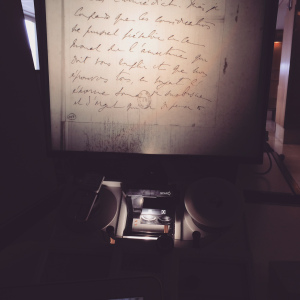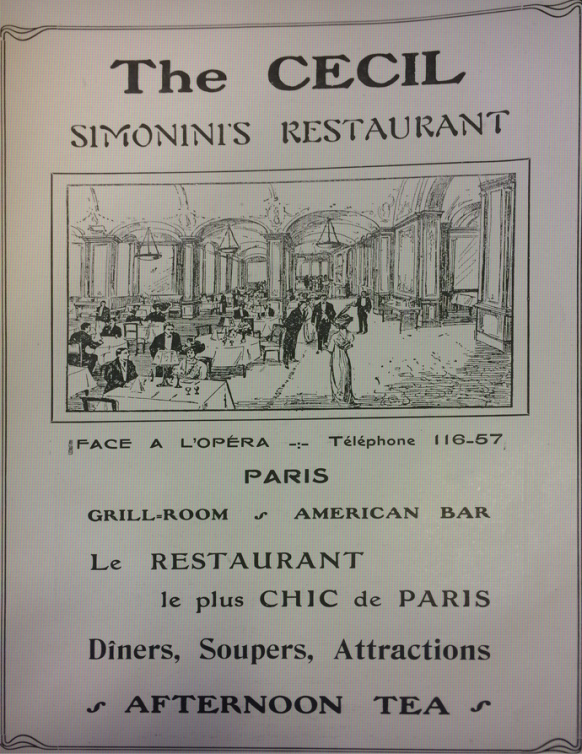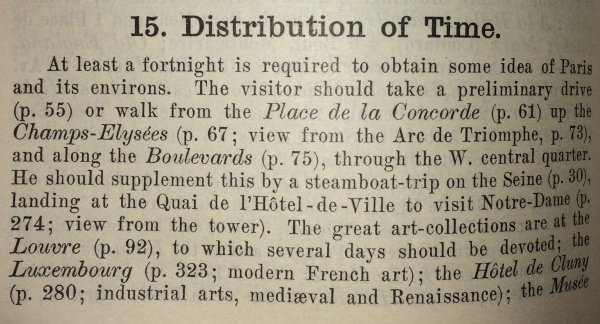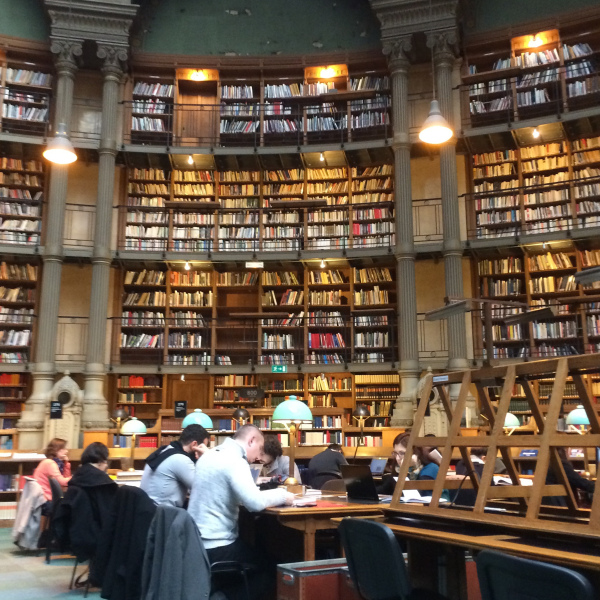Ellen Davies: 'In Paris, 1913'

I’m sitting at my desk, time-travelling.
Outside, 21st century Paris is heavy with the first infestation of springtime tourists, snapping up the Opéra on selfie-sticks as they emerge, blinking, from the Métro.
Inside, in a stuffy room in the Bibliothèque national de France, unbeknown to those around me, I’m not there. I’m in 1913.
OPEN TAB There’s a five-digit phone number to call, if I want to make reservations for tonight’s performance: dinner and a show at one of many cafés-concerts, unremarkable, forgettable, but lightly enjoyable. CLICK TO SCROLL THROUGH THE DOOR I join the crowd, spilling out onto the street afterwards and find policemen, ruffled feathers, larger-than-life characters around the corner at the new, streamlined and imposing Théâtres des Champs-Élysées HOVER OVER THE MAP TO FIND OUT MORE too modern and concrete for your tastes, but fascinatingly fashionable. They’re all talking about the nonsense of the theatre. I missed the event, but, along with several hundred other people, I can claim I was there – really, at the back, no really, such a riot! – at the infamous, orchestrated scandal of the Rite of Spring performance that night in May.

Over the following days, weeks, months the papers are joyous with chaos. Next to the cinema showings ZOOM IN for the latest hits (Fantômas is there, again, a new crime thriller series that’s caught the city’s attention MINIMISE THE WINDOW. OPEN. PLAY), there are feature columns on this composition – daring, ridiculous, silly.
Do you notice, among the talk of primitive and outrageous dance moves, the repeated observations of rhythmic irregularity, temporal discontinuity? Open the Le Mercure de France in October, and a critic is (still) lamenting the ‘mechanical rhythm’ and the ‘imposed fragmentation’ of the CHECK HEADPHONES ARE PLUGGED IN music.

They’ve already forgotten the premiere of Jeux ZOOM OUT THERE which premiered a couple of weeks earlier in the same place: Debussy’s Ballets Russescollaboration with Nijinsky for the 1913 season. In June, a feature-length piece in Le Courrier Musical criticises ‘the vagueness of line in unclear music’ BRIGHTEN THE SCREEN TO SEE THE SCRAWLING PRINT noting that ‘it was not possible to distinguish between a rhythm or one of its developments’, or the corresponding ‘mechanical gestures’ of the dancers. The critical response hints at the innovative musical temporality of these compositions, an innovation that may be connected to cultural change.
In mid-November, Proust publishes the first volume of À la recherche du temps perduCLICK, PINCH AND ZOOM ‘Longtemps, je me suis couché de bonne heure…’ OPEN TAB, SEARCH capturing and capitulating subjects of memory, time and nostalgia to the foreground of a modernist generation, one already preoccupied with the past – an idealised past that perhaps never existed.
Are these temporal experimentations connected?
CLOSE TAB.
And then, suddenly, here I am back at my desk.
In front of me is a pile of analogue materials: musical scores, manuscript editions of ‘classical’ works and ‘popular’ sheet music for cabaret and concert-hall performers, diary entries, journal notes and letters. Yet, blinking out from the dark depths of the screen, I emerge from the past, whizz through time to the present. I look back at the yellowing paper and reprinted copies on the desk, pausing for a moment from the wealth of digital tools: the zoomed in journals, interactive maps, instant online translation tools, the black and white recorded memories of the silent films, early-twentieth century crackling recordings of music, sounds, noise, that enable and intensify my research.

Images and text © Ellen Davies.
Ellen Davies is a doctoral candidate at the University of Oxford, examining musical temporality in 1913 Paris. She is the Founding Editor of an online, interdisciplinary music magazine, Noise & Silence. Ellen’s research is funded by an LMH Halstead Scholarship and a Europeaum Jenkins Memorial Scholarship. Follow her on Twitter @ellenannedavies, Instagram @ellenannedavies, and on her blog about PhD life at www.ellenannedavies.com.
